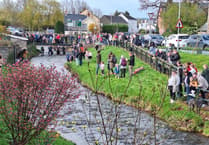A pioneering, Brecon-born woman doctor, campaigner and social reformer is to be honoured with Wales’ 11th Purple Plaque to be unveiled on the place of her birth in High Street, Brecon at 1pm on Friday, 3rd March 2023.
Dr Frances Hoggan was the first British woman to gain a medical degree in Europe.
She was also the first female member of the British College of Physicians (through her membership of the King's and Queen's College of Physicians in Ireland).
Frances travelled to Switzerland to take her degree because women were not allowed to study for medical degrees in Britain.
She graduated in March 1870, three months ahead of the much better-known Elizabeth Garrett Anderson who graduated from the Sorbonne in June that year.
As well as fighting against the odds to qualify as a female doctor, Frances campaigned for other women to be allowed to qualify and work as doctors in the UK and India.
She also fought to establish secondary schools for girls in Wales, later on also calling for social reforms in South Africa, the Middle East and the USA.
Frances was born in 1843 at 19 High Street in Brecon, currently home to the Nicholls store.
Her father was a curate at what is now Brecon Cathedral before becoming vicar of Aberavon.
He died while Frances was still a child in 1851. She continued to campaign through much of her life, passing away in 1927.
The Welsh Government Social Justice Minister, Jane Hutt, is due to unveil the plaque. She said: “As we approach International Women’s Day it’s fantastic to see Wales’ 11th Purple Plaque being unveiled to celebrate the achievements of a woman pioneer like Frances Hoggan.
"She became a doctor in the nineteenth century when the odds were stacked against women qualifying as medics.
“As one of the first women doctors in Britain she worked closely with the others who are lauded for their achievements as medical pioneers, Elizabeth Garrett Anderson and Elizabeth Blackwell.
"Frances was also a woman who spoke out on social reform - especially education for women and girls - as well as on public health, race relations and animal rights.
“I hope that unveiling a Purple Plaque to mark her achievements will make sure her name is elevated to the status she deserves.”
Elizabeth Jeffreys, who founded the Brecon Story community history project and helped organise the plaque unveiling, said: “The life of Frances Hoggan is truly inspiring and something of which everyone in Brecon can be really proud.
“She fought the prejudices of her day to become a pioneer and specialist in women’s and children’s diseases - and she highlighted many other areas where progress was needed.
“As we count down to International Woman’s Day on March 8th, the life of Dr Frances Hoggan reminds us of the difference made by those early female pioneers.
“It would be great to see people come and witness the unveiling of the plaque outside Nicholls in the High Street at 1pm on Friday 3rd March."
Sue Essex, Chair of Purple Plaques Wales said: “The Purple Plaques campaign started in 2017 as a way of remembering the achievements of the many remarkable women in Wales who’ve sadly been by-passed by the history books.
"We are a group of volunteers who work with local community groups and organisations to get Purple Plaques for women and we are very proud to honour such an outstanding woman as Frances Hoggan.
"I hope she inspires many young women of today to push the boundaries and help others coming along behind them.”
The plaque is being sponsored by the Learned Society of Wales. Society President, Professor Hywel Thomas added: “Frances Hoggan exemplified Wales’ dissenting tradition, through her campaigning on women’s health, education for girls and the right of women to study medicine.
“The Learned Society of Wales recognises these pioneering contributions through our annual Hoggan Medal, which celebrates outstanding contributions by women in STEM subjects.
“We are therefore delighted to be sponsoring this purple plaque in Frances Hoggan’s honour and hope it kindles further interest in this remarkable woman.”




